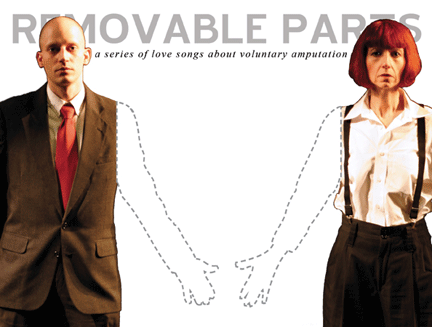Corey Takes It All Off

Last week I went to Corey Dargel’s new postmodern cabaret show “Removable Parts,” and it was excellent. I call it “postmodern cabaret” because I’m not sure what else to call it—it was a series of songs on the theme of voluntary amputation, and they were performed by Corey and Kathleen Supové who performed in character as a sort of dysfunctional cabaret act.
The songs were delightful—intelligently composed and quirky, moving in fits and starts, building up grooves and then taking them apart, stealing from and recontextualizing various pop, rock, and classical idioms. The lyrics and dialogue were witty, treading that fine line between sad and funny. In the second song, “Hooked for Life,” Corey sings about wishing that he could have his arms amputated and replaced with metal hooks, in part because then you would have to hug him because you’d feel sorry for him, and in the middle of this somewhat sad and grotesque imagery he observes that “you’d be hooked for life” and promptly apologizes for the pun. And somehow it’s these witticisms, the melancholy self-mockery and the harsh words between “Corey” and “Kathy,” (“You may be the kindest pianist, but you’re definitely not the smartest”) that end up humanizing the very real condition with which they are dealing.
For indeed, the desire for amputation is a symptom of a genuine condition called Body Integrity Identity Disorder, or BIID. The condition results in a belief that one’s body configuration is incorrect—that, for instance, my correct configuration is with no left arm. BIID is as difficult to grapple with philosophically as it is to comprehend psychologically, and the show makes no attempt to answer the questions. Rather, we are taken on a journey from the apparently absurd—“apparently” because this is, after all, a real condition—to a sense of recognition, empathy, and a measure of understanding. How different, after all, is it to want to remove a “superfluous” leg than to want to remove, as “Kathy” does, “excess” bodyfat?
In the end, though, a show like this lives and dies on the quality of the music, and the music did not disappoint. Corey’s great talent is the integration of fragmented and disjointed ideas into a cohesive whole. He writes beautiful, leaping melody lines. His lyrics often seem more like prose than like poetry, and yet in the grand tradition of songwriters like Morrisey he makes them flow as naturally as any good lyrics do, except that in the absence of forced rhymes and rhythms their confessional nature often comes through more strongly. The music is generally groove based, in a consistent time signature, but the rhythms push and pull against that background with disjointed piano figures clashing with disjointed kick and snare action and processed samples. My favorite song of the evening, “Fingers,” is in a quick 7/8, and the melody integrates smoothly and cleanly with the meter, but when I try to count it out and figure out how to sing it I quickly lose track due to the subtlety of the syncopation. These disparate elements are always tightly controlled, and while they push at the edges of the structure they never break it.
If you missed seeing the show in person, I understand that excerpts will also be featured on WNYC’s “Spinning On Air” program at some point in the near future. After that, you’ll just have to hope for a CD or a DVD release.
I was waiting for the movie version of the musical based on the play, but I hear it went straight to video and is now only showing on airplanes.
Nice review, Galen. I’m hoping for a tour in addition to a CD/DVD.